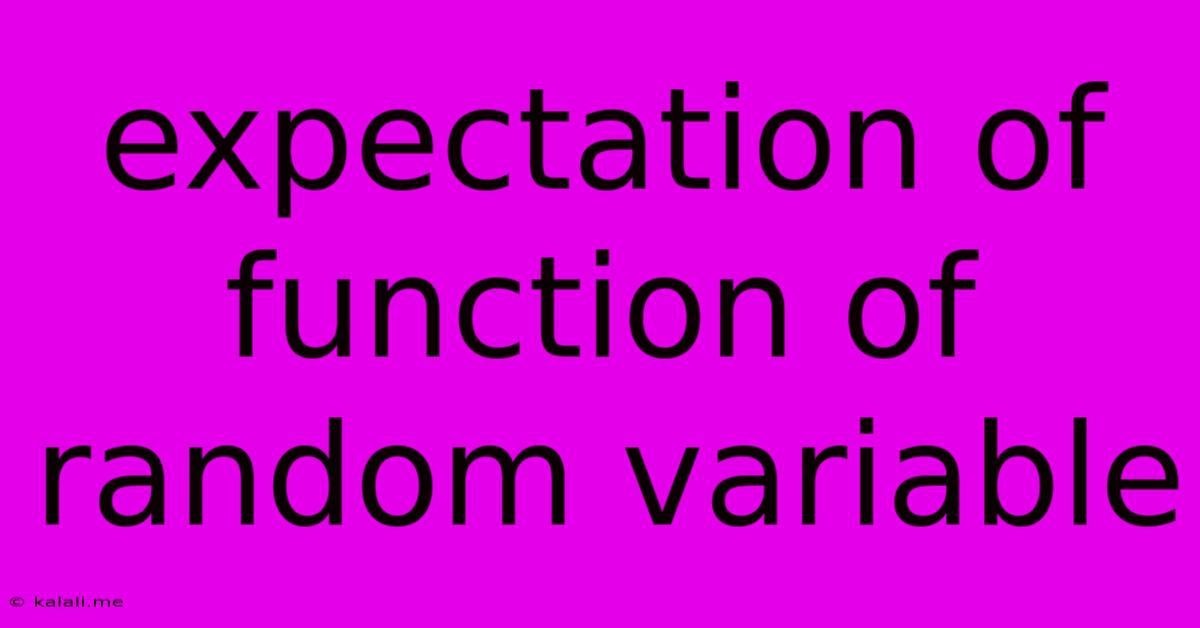Expectation Of Function Of Random Variable
Kalali
May 31, 2025 · 3 min read

Table of Contents
Understanding the Expectation of a Function of a Random Variable
The expectation, or expected value, of a random variable is a fundamental concept in probability and statistics. It represents the average value of the random variable over many trials. This article delves into a crucial extension of this concept: the expectation of a function of a random variable. Understanding this allows us to calculate the expected values of more complex quantities derived from our initial random variable. This is essential for many applications, including calculating variance, moments, and other important statistical measures.
What is the Expectation of a Random Variable?
Before diving into functions of random variables, let's quickly review the expectation of a random variable itself. For a discrete random variable X with probability mass function P(X=x), the expectation, denoted E[X], is calculated as:
E[X] = Σ [x * P(X=x)] (summation over all possible values of x)
For a continuous random variable X with probability density function f(x), the expectation is:
E[X] = ∫ x * f(x) dx (integration over the entire range of x)
The expectation provides a measure of the central tendency of the distribution.
Expectation of a Function of a Random Variable: The Key Idea
Now, consider a function g(X) of a random variable X. The expectation of this function, denoted E[g(X)], represents the average value of g(X) over many trials. The method for calculating E[g(X)] depends on whether X is discrete or continuous.
Discrete Random Variable:
For a discrete random variable X, the expectation of g(X) is:
E[g(X)] = Σ [g(x) * P(X=x)] (summation over all possible values of x)
This formula intuitively makes sense: we weight each possible value of g(x) by its probability.
Continuous Random Variable:
For a continuous random variable X, the expectation of g(X) is:
E[g(X)] = ∫ g(x) * f(x) dx (integration over the entire range of x)
Examples and Applications
Let's illustrate with some examples:
Example 1: Variance
The variance of a random variable X, denoted Var(X), measures the spread or dispersion of the distribution. It's defined as:
Var(X) = E[(X - E[X])²]
Notice that the variance is the expectation of a function of X, specifically the squared deviation from the mean.
Example 2: Moments
The kth moment of a random variable X is defined as E[X<sup>k</sup>]. The first moment (k=1) is simply the expectation E[X]. The second moment (k=2) is useful in calculating the variance. Higher-order moments provide information about the shape of the distribution.
Example 3: Transformations of Random Variables
Suppose you have a random variable X representing the diameter of a tree trunk, and you want to find the expected volume (assuming a cylindrical shape). The volume is a function of the diameter: V = π(X/2)². You can use the expectation of a function to find E[V] = E[π(X/2)²].
Key Considerations and Properties
- Linearity of Expectation: A crucial property is the linearity of expectation: E[aX + b] = aE[X] + b, where 'a' and 'b' are constants. This simplifies many calculations.
- Independence: If X and Y are independent random variables, then E[XY] = E[X]E[Y].
- Non-linear functions: For non-linear functions g(X), E[g(X)] ≠ g(E[X]) in general. This is a common mistake to avoid.
Conclusion
The expectation of a function of a random variable is a powerful tool for analyzing probability distributions. Understanding this concept is fundamental for calculating various statistical measures and solving problems involving transformations of random variables. Mastering this concept significantly improves your understanding and application of probability and statistics in diverse fields.
Latest Posts
Latest Posts
-
How To Spell The Sound Of Crying
Jun 01, 2025
-
Water Leaking From Water Heater Drain Valve
Jun 01, 2025
-
How To Remove Dog Pee Scent
Jun 01, 2025
-
Blue Devil Head Gasket Sealer Reviews
Jun 01, 2025
-
Dont Starve Characters Not In Dont Starve Together
Jun 01, 2025
Related Post
Thank you for visiting our website which covers about Expectation Of Function Of Random Variable . We hope the information provided has been useful to you. Feel free to contact us if you have any questions or need further assistance. See you next time and don't miss to bookmark.